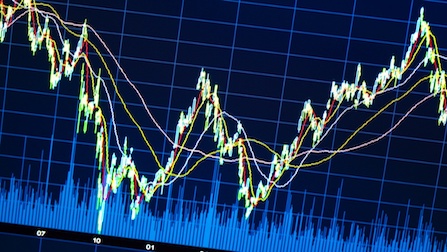- The market discounts everything, which means that an asset’s price reflects everything that has or could affect the company and thus there is no need to consider these factors separately;
- Price moves in trends, which means that any future price movement is more likely to be in the same direction as the trend;
- History has a tendency of repeating itself, which means that a consistent reaction is given to similar market stimuli over time.
10 Rules of Technical Trading
To perfect the art of trading using technical analysis, here are some crucial rules that you must keep in mind:
-
Map the trends by studying long-term charts. Start a chart analysis with weekly and even monthly charts that span over several years as a large scale map of the market provides the trader with a greater amount of visibility and a better perspective on the long-term market. Short-term market views can be deceptive.
-
Spot the trend and follow it. Market trends come in many sizes (short, intermediate and long-term), and you should determine which one you’re going trade and then trade in the direction of the trend. Also, make sure that the charts you use are by the trend.
-
Find the support and resistance levels, as the best place to buy is near support levels and the best place to sell is near the resistance levels. This rule functions on the concept that the old highs become the new lows.
-
Understand how far to backtrack. Measure the percentage retracements. A 50% retracement of a prior trend is most common, and a minimum retracement is usually one- third of the prior trend.
-
Draw trendlines. These are the most simple, yet effective charting tools that are available as all you need is a straight line and two points on a chart. Uptrend lines are drawn along two successive lows, while downtrend lines are drawn along two successive highs. When a trendline is broken, it usually shows a change in the trend.
-
Follow the averages. Moving averages are your source of objective buy and sell signals, and they help in confirming a trend change. The most popular way of finding trading signals is by combining charts of two moving averages.
-
Track oscillators. They help traders identify markets that are overbought or oversold. They also help warn traders of markets that have rallied or fallen too and may turn soon. The most popular oscillators are Relative Strength Index (RSI) and Stochastics.
-
Know the warning signs by using MACD. The Moving Average Convergence Divergence (MACD) indicator combines an average moving crossover system with the overbought
or oversold elements of an oscillator. A buy signal may be justified when the faster line crosses over the slower, and both of the lines are below zero; while a sell signal may be warranted when the faster line crosses the slower line and both of the lines are above zero. An MACD histogram plots the difference between the two lines and provides even earlier warnings of any changes. -
Use ADX to determine whether it is a trend or not a trend. The Average Directional Movement Index (ADX) line helps in determining whether a market is in a trending or trading phase. It measures the degree of trend or direction within the market. By plotting the direction of the ADX line, a trader can determine which trading style and which indicators are suitable for the current market.
-
Know the confirming signals. Volume and open interest are the most popular indicators. Volume precedes price and it is crucial to make sure that heavier volume is taking place in the direction of the prevailing trend. Rising open interest ensures that new money is supporting the current trend.
Popular Technical Analysis Tools
These indicators and tools are used to predict future movements of prices in the market, and they are the reason for technical analysis gaining increasing popularity in the trading domain:18
-
On-Balance Volume,
-
Accumulation/Distribution Line,
-
Average Directional Index,
-
Aroon Indicator,
-
MACD,
-
Relative Strength Index,
-
Stochastic Oscillator.
Critique of Technical Analysis
Criticisms of technical analysis include:
-
It works only because it is self-fulfilling. It only works because traders believe it works and acts by this belief.
-
There is no hard proof that technical analysis works. There seems to be evidence which indicates that the kinds of technical analysis that work change over time with different markets and time periods being suited to different methods of technical analysis.
-
Price changes are random and cannot be predicted. This belief, held by the efficient market hypothesis, states that markets react immediately to information affecting an asset’s intrinsic value.
Thus, the technical analysis also has its drawbacks, but this does not stop it from being one of the most popular trading analysis techniques and the scientific approach that is used in this analysis with the use of tools, makes it quite efficient and effective in the prediction of future price movements.19
Read the full article and more download our FREE Insiders Guide to Forex and CFDs. That’ll Help to Improve Your Forex & CFD Trading Skills and Assist You to Make Consistent returns!






